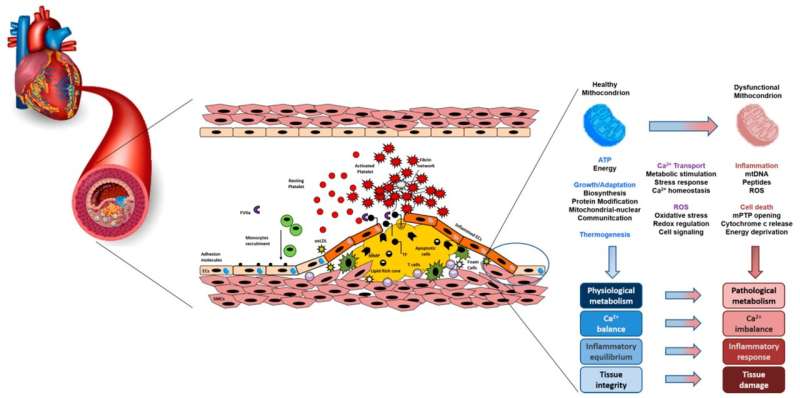This article has been reviewed according to Science X's editorial process and policies. Editors have highlighted the following attributes while ensuring the content's credibility:
fact-checked
proofread
Malfunctioning mitochondria at the heart of many cardiovascular diseases

Many cardiovascular diseases, such as atherosclerosis, or "hardening of the arteries," correlate to mitochondrial dysfunction and endothelial impairment in the tissues of the heart and blood vessels. Despite a significant improvement in therapies to treat cardiovascular disease, there is an unmet need to investigate mitochondria as a therapeutic target.
A review published recently in the International Journal of Molecular Sciences explores the existing literature on relevant studies and makes recommendations for further study. The paper was written by Professor Giovanni Ciccarelli, M.D., Interventional Cardiologist at Monaldi Hospital of Naples, Italy, and Adjunct Professor of Biology at the College of Science and Technology at Temple University. Co-authors include an international team working with the Sbarro Institute for Cancer Research and Molecular Medicine and the Sbarro Health Research Organization (SHRO), which is led by SHRO Founder and President Antonio Giordano, M.D., Ph.D., professor at Temple University and the University of Siena.
The authors of the paper, titled "Mitochondrial Dysfunction: The Hidden Player in the Pathogenesis of Atherosclerosis?" propose a closer examination of this relationship between mitochondrial dysfunction, endothelial impairment, and atherosclerosis is necessary in order to identify new precision medicine targets to better regulate mitochondrial functioning in patients with these conditions.
Malfunctioning mitochondria causes endothelial dysfunction due to a molecule called a reactive oxygen species (ROS), or "free radicals," which are produced by the dysfunctional mitochondria. The increase in ROS then leads to oxidative stress, inflammation, and a buildup of cholesterol and lipids, forming atherosclerotic plaque in the blood vessels.
The modulation of mitochondrial function through precision medicine could delay the development of this endothelial dysfunction.
Although mitochondria have been recognized as a new therapeutic target in different pathological contexts, no clinical or preclinical studies have been designed on atherosclerosis.
Both antioxidants and gene therapy are attractive approaches for the treatment of atherosclerosis, however, further studies are needed.
The authors hope to start new clinical or preclinical trials to explore the effect of mitochondrial modulation on development of atherosclerotic plaque, in order to evaluate if this kind of therapeutic intervention could lead to a significant reduction of residual risk related to ischemic cardiovascular disease.
More information: Giovanni Ciccarelli et al, Mitochondrial Dysfunction: The Hidden Player in the Pathogenesis of Atherosclerosis?, International Journal of Molecular Sciences (2023). DOI: 10.3390/ijms24021086



















